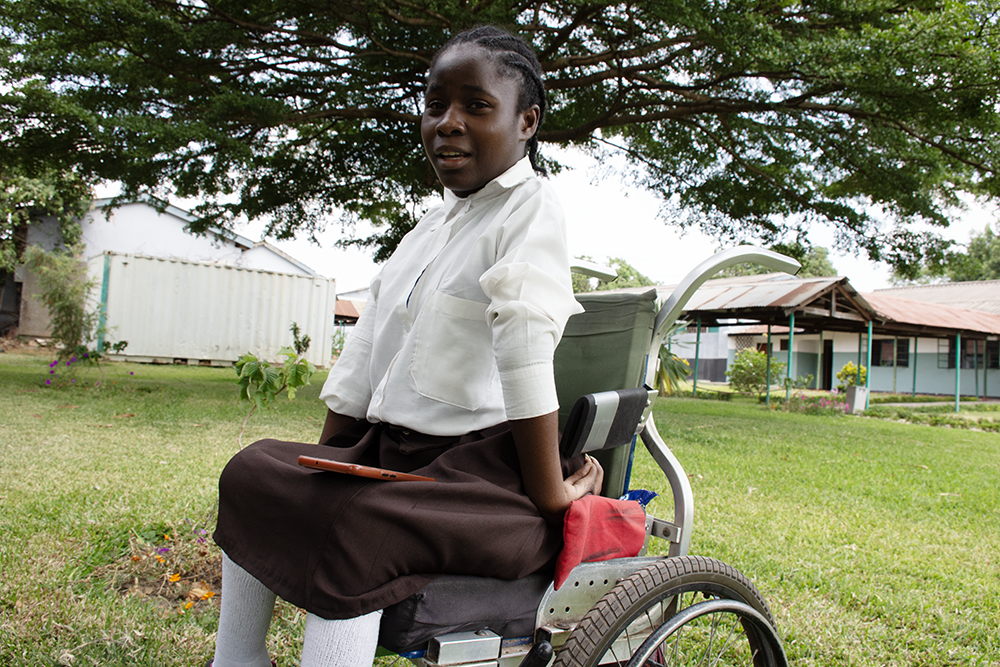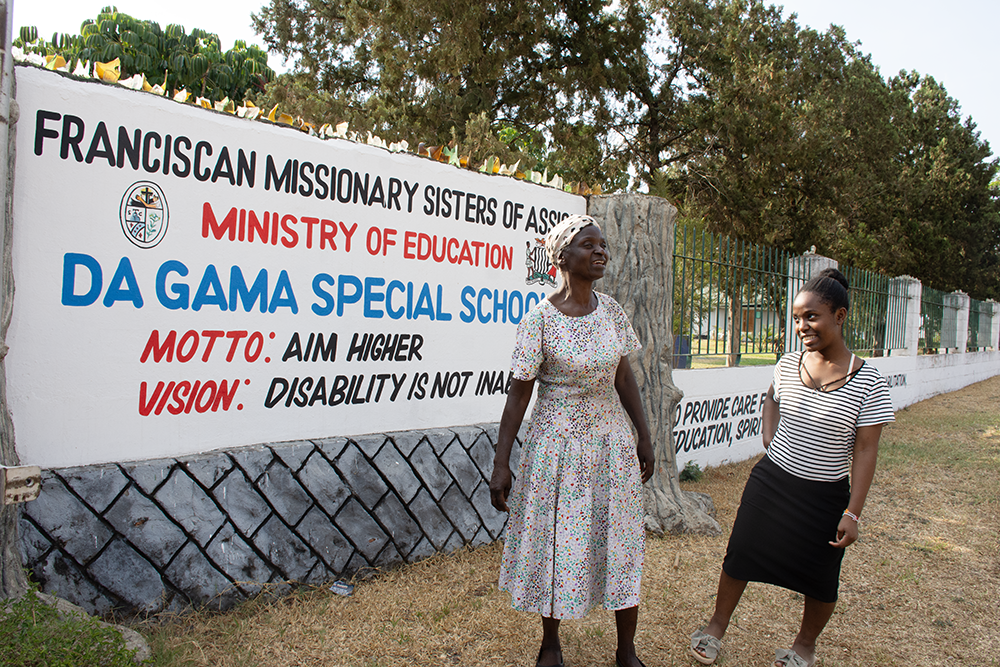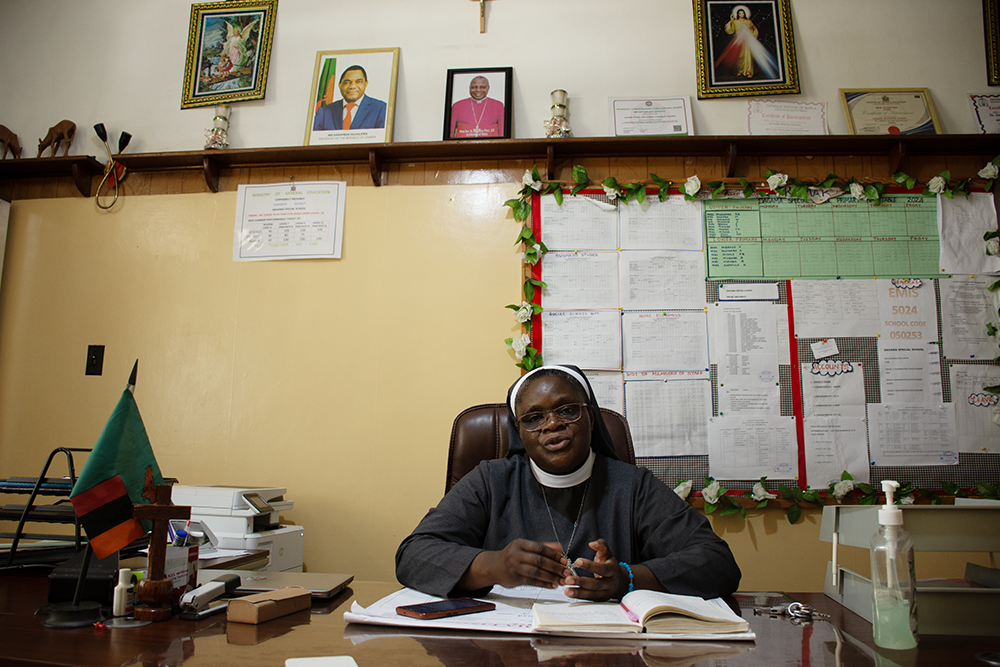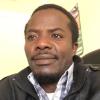
Hope Chipete poses for a photo at Da Gama Special School. She was among 10 girls with disabilities who earned a school scholarship from the office of the First Lady of Zambia through the Merck Foundation, which took up the responsibility to sponsor their education until the tertiary level. (GSR photo/Derrick Silimina)
The heart of Zambia's small mining town, Luanshya, is a dream school for inclusive special needs education about 300 kilometers north of the capital Lusaka.
Hope Chipete and her grade 11 classmates are absorbed in their assignments and studying for the end-of-term examinations at Da Gama Special School for physically disabled children. The school is run by the Franciscan Missionary Sisters of Assisi, who help vulnerable children make the most out of their education.
"I used to complain to God about why I am like this, especially as a kid. I worried that I wouldn't be able to do anything because some people used to say that I can't do many things like writing," Chipete told Global Sisters Report.
The 17-year-old was born with hypochondroplasia, a bone growth disorder that results in short stature and disproportionately short arms and legs. However, her dream of studying journalism after high school is a testament to her determination and perseverance in the face of discrimination. As the only child with a physical disability in her family of three girls, she is upbeat because she can thrive academically.
Advertisement
Chipete paid glowing tribute to school administrators for providing a conducive environment for her and other children with disabilities to access holistic education and hope for a brighter future.
"I am now able to write and draw with ease. I also participate in our school's debate club and do all sorts of things. I feel comfortable here because I can see a lot of people who are differently disabled. I thank God because if I were able-bodied, I wouldn't have reached where I am today."
Chipete has moved many hearts with her eloquence in school debates and poetry, including the Zambian First Lady, Mutinta Hichilema, during a school tour at the State House in Lusaka, the official residence of the president of Zambia. She was among 10 girls with disabilities who earned a school scholarship from the office of the First Lady through the Merck Foundation, which sponsored their education until the tertiary level.
Established in 1961 as a home for unwanted children and later transformed into a facility for children of the British working class during Zambia's colonial era, the facility has evolved into a special needs learning center. In 1972, the institution was declared a grant-aided school, which means the facility receives funds from Zambia's Ministry of Education. It consists of a boarding school for 140 children with physical disabilities and a day school for 30 vulnerable children from nearby provinces.
According to the 2015 Zambia National Disability Survey, 10.9% of adults and 4.4% of children between two and 17 are disabled.

Roydah Namukolo and her daughter Sepo Namukolo arrive at Da Gama Special School. (GSR photo/Derrick Silimina)
Sepo Namukolo experienced a fair share of discrimination during her primary school days in a society where disabled children face rejection and isolation and are considered a burden to their families.
"I discovered that I was disabled at the age of seven, and it hurt to see people laughing at me whenever I went to school. Few people really loved and supported me, but the majority mocked me because of my disability. They said I was an outcast and [that] my parents were cursed," Namukolo told GSR.
Namukolo, 18, was transferred to Da Gama Special School in the third grade and is now in grade 11. The school has improved her academic performance and given her a positive outlook in life. Despite her disability, Namukolo now works at Da Gama Special School and is determined to pursue her dream career.
"I hope to become a pediatrician and open an orphanage to give a helping hand to many vulnerable street children in the country," she said.
When she was two, her mother, Roydah Namukolo, 50, discovered she was not growing like other children. The mother of three became depressed and remained in denial for several years. She explained that her discomfort was triggered by the stares and poor treatment her daughter faced daily, especially by her schoolmates. As a result, she quickly sought a transfer request for her daughter to the Da Gama Special School.
"I am thankful for the school management, headed by religious sisters, who mold our children to become better people in society. My child is progressing very well academically without any discrimination on account of her disability," she told GSR.

Sr. Ruth Ndhlovu, the headteacher at Da Gama Special School, poses for a photo in her office. She has worked at the institution since 2022 and is in charge of primary and secondary schools from grades one to 12. (GSR photo/Derrick Silimina)
Stigma against people living with a disability is common in the southern African country due to negative traditional beliefs, entrenched stereotypes and ignorance. As a result, children and adults with disabilities are often neglected, isolated and discriminated against.
Sr. Ruth Ndhlovu, the headteacher at Da Gama Special School, has worked at the institution since 2022 and is in charge of primary and secondary schools from grades one to 12.
"In 1966, the facility became our apostolate, and since then, we provide care for all learners with holistic education through rehabilitation and spiritual insights and later integrate them into society," Ndhlovu told GSR.
Ndhlovu, 48, has worked as a teacher in government and mission schools since 2001. She said that the facility deals with various physical disabilities, including children suffering from spina bifida, brittle bones and muscular dystrophy, among others.
She said the institution helps students and their guardians to go through counseling, especially those who have not yet accepted their physical disability, to help demystify their condition and avoid stigma.
"We know it's not easy for some people with traditional beliefs, but we assure parents and the community that disability is not an inability."
The school's deputy head teacher, Jane Chabala, said special education requires patient, loving teachers to teach children with disabilities, especially since some learners cannot write using their hands but use their feet or mouth instead.
Chabala, who has been at Da Gama Special School for 14 years, shared many success stories, including its impressive pass rate. "Right now, so many of our students are in universities, including the Copperbelt University, Mulungushi University and Mukuba University, among others," she said.





